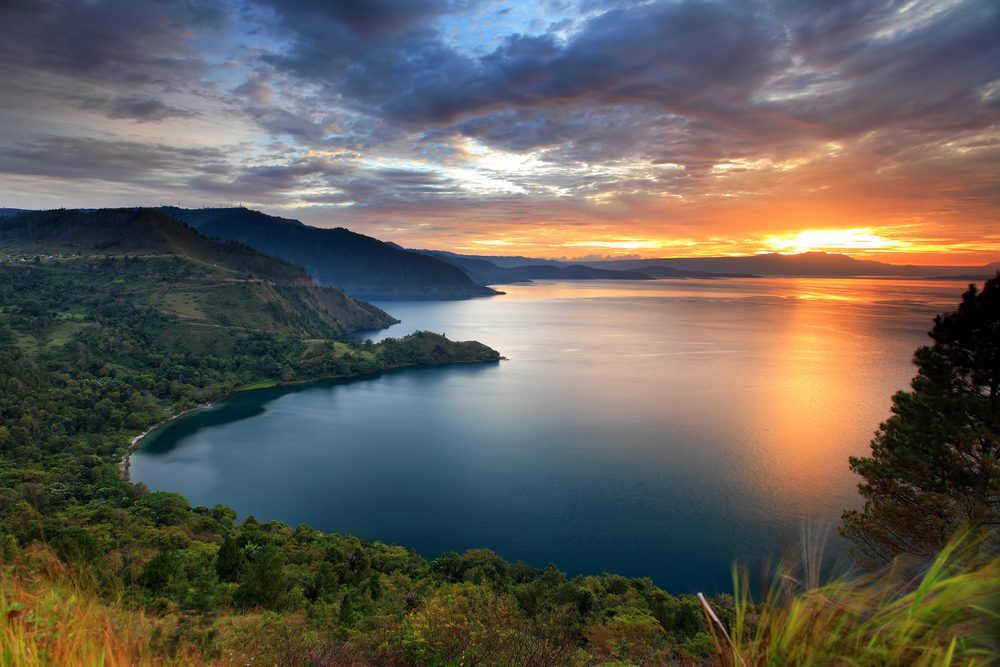There’s a theory – and it is just a theory – that the human population on Earth was once decimated to just a few thousand individuals after a supervolcano violently erupted on the Indonesian island of Sumatra. For a small sliver of history, humanity may have become an endangered species.
While not everyone buys this story, it raises the fascinating possibility that all of humanity is actually a lot more closely related than other narratives suggest.
Proponents of this idea call it the Toba catastrophe theory. By looking at Earth’s geology, it’s clear that a supervolcano erupted around Lake Toba in Indonesia around 74,000 years ago. For a little more context about this pivotal time period, modern Homo sapiens only evolved 200,000 years ago and record history has only been around for 6,000-odd years.
Described as the “most powerful eruption in human history”, the volcanic incident at Toba flung huge amounts of dust and debris into Earth’s atmosphere, cloaking the sky in a thick blanket of soot that blocked out the Sun.
The extent of this “volcanic winter” is hotly debated, but some scientists contend that the volcanic ash could have possibly reduced the global temperature by upwards of 5°C (9°F) for several years. In areas around Toba, the regional drop in temperatures could be as much as 15°C (27°F).
Those figures are towards the upper range of possibility, with more modest estimates suggesting that temperatures dropped by 1°C (1.8°F).

Lake Toba looks peaceful now, but don’t be fooled. Image credit: franshendrik Tambunan/Shutterstock.com
Whatever exact estimate we take, it’s clear from modern-day climate change that even 0.5°C (0.9°F) of temperature change can have an intense effect on the world and its inhabitants. The natural world could have become upturned, with plants failing to grow and animal life perishing.
Another curious incident occurred in the wake of the Toba supervolcano eruption.
Around 60,000 years ago, there is evidence that humankind underwent a “genetic bottleneck”, indicating that the global population suddenly crashed. Some have gone as far as to argue that there may have been between 3,000 to 10,000 humans of reproductive age left on Earth.
Is it possible that the Toba supervolcano caused a global catastrophe that very almost wiped humans off the planet? Some scientists have certainly flirted with this bold idea.
Others, however, say that this theory has been disproven. In 2013, researchers studied sediments from thousands of kilometers away from the volcano in East Africa and argued that there’s not much sign of ash and very little evidence of substantial temperature change here.
“The eruption would certainly have triggered some short-term effects over perhaps a few seasons but it does not appear to have switched the climate into a new mode,” Dr Christine Lane, lead author of the study from Oxford’s School of Archaeology, told BBC News in 2013.
“This puts a nail in the coffin of the disaster-catastrophe theory in my view; it’s just too simplistic,” she added.
Although there are big doubts surrounding the Toba catastrophe theory, the cause of this apparent disruption to the human population around this time remains hazy.
Whatever the cause, however, it looks like our bounce-back was strong. Genetic studies also imply that the population exploded around 50,000 years ago, while other evidence shows humans were expanding around Eurasia and undergoing incredibly fast technological growth.
The past 40,000 years of human history are when things really started to heat up. Changes in technology and the flourishing of artwork suggest that our cognitive abilities substantially increased around this time, eventually paving the way for the advent of agriculture and civilizations. Today, the human population stands at a sturdy 8 billion.
This prehistoric chapter of our past may be hazy, but it appears it’s hard to keep humanity down for long.
Source Link: Toba Volcano Catastrophe: Was This Our Closest Call With Extinction?